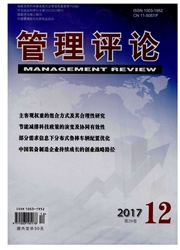

 中文摘要:
中文摘要:
考虑零售商存在损失厌恶心理,当制造商无环保意识和有环保意识时,分别建立零售商效用函数和制造商利润函数。基于博弈模型,得到制造商的最优定价策略和零售商的最优订货策略。通过数理模型与算例分析,得到如下主要结论:订货量和批发价格随着损失厌恶增加而减少;环保意识能够促使制造商降低批发价格,激励零售商增加订货,弱化损失厌恶对企业和供应链绩效带来的不利影响;且当损失厌恶程度较大时,环保意识对零售商发挥更大的激励作用。
 英文摘要:
英文摘要:
Considering retailers' loss-aversion psychology,retailers' utility function and manufacturers' profit function are established respectively under two circumstances,in which manufacturers obtain the environmental awareness or not. Manufacturer's optimal pricing strategy and retailer's optimal ordering strategy are obtained based on game models. Through theoretical and numerical analysis,following conclusions are drawn: order quantities and wholesale price decrease along with the increase of loss-aversion; environmental awareness promotes manufacturers to lower their wholesale prices and motivates retailers to increase order quantities,meanwhile,it weakens the loss-aversion effects on the performance of both enterprises and supply chains. When the loss-aversion is stronger,the environmental awareness plays greater incentive to retailers.
 同期刊论文项目
同期刊论文项目
 同项目期刊论文
同项目期刊论文
 期刊信息
期刊信息
